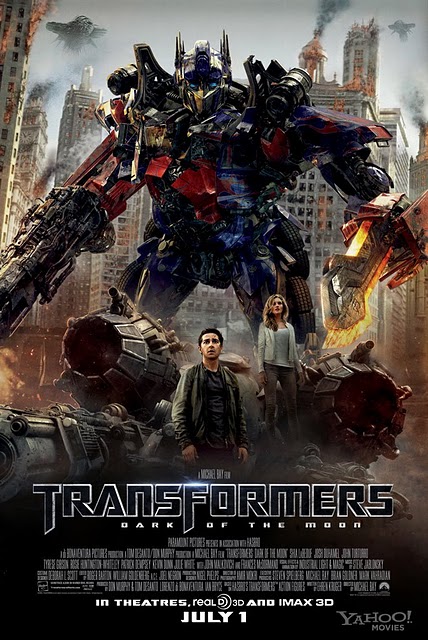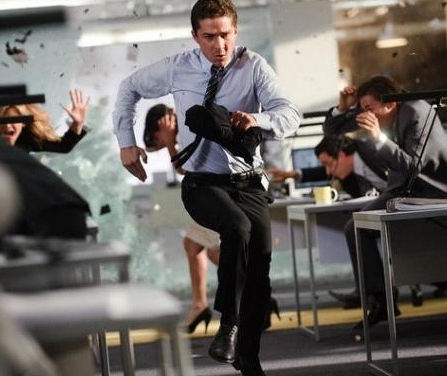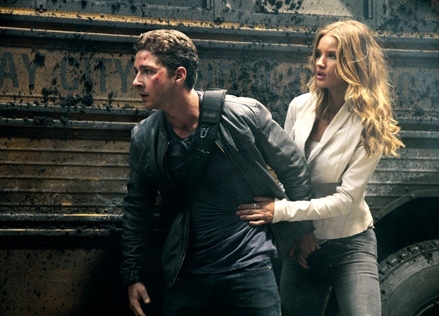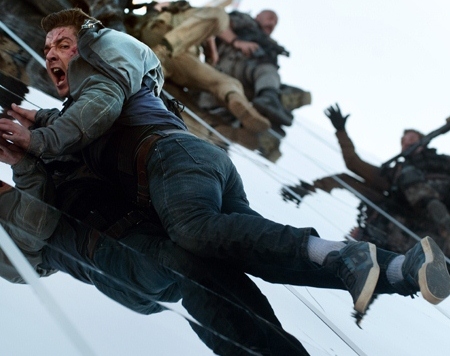Sam Witwicky: Greatest Hero of Our Time [Part 3]
(This is the final piece of a three-part analysis of the Transformers mythology. Warning: each article contains spoilers for the movie it covers.)
Transformers 3: Dark of the Moon: No Heroes Need Apply
After the events of Transformers 2: Revenge of the Fallen, Sam, in true American style, returns to school to fulfill the college rite of passage, finishing what he started (and probably running up a six-figure debt in the process). Though a higher education is not necessary for a hero of his caliber, it can nevertheless be beneficial in this country, especially if Sam wants to get a good, steady job someday. It looks good on a resume, balancing out other accomplishments, like being the two-time savior of the world.
Unfortunately, during difficult economic times, most job markets take a hit. Even for a person who has received a presidential medal, has innumerable connections with high government officials, and grasps seventeen dimensions that span both physics and mathematics, the current recession in the United States is challenging. Similarly, the American public, going through tough times, identifies with Sam, seeing itself in his economic difficulties. But the pursuit of a job that fits one’s own particular qualifications is the American way after college is over, making it a pursuit that must be undertaken. Going out into the world and contributing to the well-being of the country is what it is all about. Like all Americans, Sam just wants to “matter.” But, obviously, his determination to matter is far more intensified than anyone else’s. Having saved the world on two separate occasions, aspiring to matter more is not the easiest ambition, but that is what makes Sam so fascinatingly self-motivated–and so unquestionably American. Regardless of what anyone says or what stands in his way, Sam is going to go after his dreams. His perseverance is a constant characteristic, and it is what makes audiences continue to come back to these movies.
Optimus Prime: You may lose faith in us, but never in yourselves.
What also makes audiences come back are the Transformers, because they keep coming back as well. In Transformers 3: Dark of the Moon, the Decepticons have a new method of destruction. This time, the Decepticons wish to rebuild their home world, Cybertron. To accomplish this, they need to collect the remaining Pillars (used to create a space bridge) which allow them to transport their planet here so that they can use the resources of earth to restore it to its former greatness. Of course, that means that earth will suffer greatly. With a population of over six billion people, the earth has a perfect job market for slavery (and certainly it is not the type of job most people are looking for, even during a terrible recession). And this country, in particular, finds itself with job options in the future; the problem is they are terrible job options.
Sam’s present job circumstance implies a decline of some hero characteristics, mainly his great freedom. Bumblebee no longer stays with him, and his car (of the same make, ostensibly) is falling apart. His once-beautiful and lively freedom is now a piece of junk–borderline dead. Because he has no vocation, and the fact that, without a vocation, he cannot maintain a level of personal independence that he once had, his pursuit of happiness has stalled along with his car (and he needs to get rides to job interviews by his parents, a degeneration to an almost infantile state of existence). Sam cannot find a job that suits his specific qualifications–being an American hero. And, after many failed interviews, he has to take a job in the mailroom under a boss (John Malkovich) who runs a tight ship, which means he has even less freedom in the workplace. The hero seemingly has to start from scratch; all that he has done doesn’t matter anymore. As spoken by Charlotte Mearing (Francis McDormand), new head of NEST, to Sam when he tries to rejoin the Transformers, “You are not a soldier. You are a messenger. You’ve always been a messenger.” It is a statement that is blisteringly ironic when spoken to the newly employed mailroom employee. Going from hero to mere messenger is an unsettling turn of events. What he has done for the planet is downgraded to nothing more than a side character in the war between Transformers. His integrality has been not only questioned, but redefined. In this new setting, he is no longer a hero, a person who goes out into the battle resolutely; he is just an onlooker with a few facts and fewer feats, someone who stays out of the fray.
This attack on his merits and his inability to get a good job parallels his romantic troubles as well. Having been dumped by Makaela, Sam has lost some of his heroic spark. He has become demoralized by his failure to remain attractive enough to others. His prowess has gone dormant for the time being. And the fact that his new girlfriend currently has a successful lifestyle and job–which deals in cars, no less–doesn’t help matters either. Carly Spencer (Rosie Huntington-Whiteley) works with a collector and purveyor of cars, named Dylan Gould (Patrick Dempsey). Carly is the perfect impetus to revive his heroic status, to transform him back into the great American symbol that we all know and need.
Carly Spencer: My hero needs to wake up.
Sam sets out to be a hero again by trying to protect Carly from Dylan, who turns out to be working with the Decepticons (and Carly’s car has been a robot in disguise the whole time, assigned to keep an eye on Sam and Carly). Dylan is the perfect foil for Sam: he is an immensely successful business man who makes no healthy contribution to society because he cares only about his own well-being. He is helping the Decepticons to take over the world because it allows him to continue living the life he has. Everyone else is to be enslaved and suffering while he hopes to keep his cushy existence in place. And Dylan, using Decepticon tech, forces Sam into becoming a spy for the forces of evil. Handcuffed by a watch-like contraption that takes away his autonomy (disallowing him to inform the Autobots what has happened to him and what the Decepticons plan to do), Sam is removed of all heroic attributes. He has no freedom and he has no know-know. He is back to square one, devolved to a heroic nonexistence. But at this non-existent heroic state, Sam is able to reclaim his prominence in a way that was previously impossible. He is able to a hero–without the Autobots being there to help out.
Optimus Prime: From here, the fight will be your own.
When the freedom-destroying machine falls off, Sam is reborn. He can fulfill his destiny and get the distinction he deserves. Unlike Dylan, Sam cares about himself as a hero which, in turn, means he must be important for everyone else. Being a hero to everyone implies that he has to risk his own life; to selflessly defend the earth is all that matters to him–and the only way to make himself matter. Being a hero is his vocation, his calling. All other professions are meaningless in comparison, especially when the Autobots are betrayed by Sentinel Prime, an early Autobot leader who brought the Pillars to the moon, which causes a chain of events that forces the Autobots to leave the planet.
With the Autobots apparently out of the picture, the Decepticons have free reign to do what they wish–to punish and enslave. They can transport Cybertron to earth with the Pillars and the expertise of Sentinel Prime (who uses the Matrix of Leadership to kick-start it). Overtaking Chicago’s Central Business District–which shrewdly pits normal vocations versus heroic ones in the cubicle-shattering and building-toppling battleground–and making it a impenetrable fortress in an attempt to protect the Pillars, the Decepticons believe there is no one left on earth with the determination to risk entering. But they forget about Sam who is willing to risk it all to save Carly (who is imprisoned there by Dylan) and the whole human race. Though Sam is accompanied by members of NEST, he is far more determined to go the extra mile to win the day, to prove his importance–to become a hero who is unforgettable. With the clever use of a Transformer grabbling gun, Sam shoots out the eye of a Decepticon (a clever homage to Greek hero Odysseus and the Cyclops), which duly gives the NEST members the idea to use their sniping skills to take out the eyes of their enemies, giving the humans the capacity to face foes that had traditionally overwhelmed them. With Sam’s leadership, the humans are able to make great strides against the Decepticons, without the need of the Autobots.
But for the humans to go the whole distance to victory, the Autobots would be an asset in the rapid-fire action and, fortuitously, they return for the final battle against Sentinel Prime, Megatron, and the rest of the Decepticons. As Optimus Prime does away with Sentinel Prime and Megatron, Sam goes toe-to-toe with Dylan, who reactivates the Pillar once it had been turned off, bringing Cybertron closer to earth. In addition to signaling a galactic change, the reactivation brings about a seismic shift in regards to Transformers movie lore: a human, not a Decepticon, has put earth in cosmic danger; Dylan has filled the role as the force that is detrimental to the hero’s society. He is the personification of the economic and social collapse, driven by selfishness and greed. Just like in his profession as a car collector/purveyor, he believes that he has the power to decide who should be free–and, since he is a collector, he has far more cars than necessary, which limits the precious cars on the market, and therefore limits freedom. And instead of fighting for earth, he chooses to “save a whole other world” because it is in his better financial interest. Ultimately, the final enemy of the world is given a face, and it is a human one. In turn, a human must face-off with the human foe to rebalance the destabilized society, to reactivate the human spirit. And Sam, stepping up to the challenge, tries to deactivate the destructive machine, and fulfill his heroic destiny.
Dylan: You think you’re a hero? You think you’re a hero?
Sam Witwicky: No, I’m just a messenger.
Knowing that being a hero has to be earned, Sam has no need to make claim to his heroic status. Rather, he informs Dylan by actively showing it (which, by being the bearer of how dogged fortitude trumps big talk, indeed fulfills the position of a messenger as well). In a final burst of determined strength and unforeseen parkouresque agility, Sam defeats Dylan by pushing him into the Pillar, electrocuting him (the ultimately symbol of how one’s actions have great consequences, and how actions that strive for finality oftentimes lead to one’s own end). And, in doing so, Sam transforms himself, from a weakened messenger boy in a quaking economy to the American hero and champion of the world–a vital vocation in any job market. With his girl in his arms and his journey accomplished, Sam truly matters to others and to himself. He has risen to the occasion, fulfilling his final rite of passage, and achieved his heroic destiny, the American Dream. And we the audience acknowledge his brave deeds and his character–both of which, in turn, shine a light on ourselves and what we dream of being.







